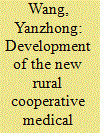| Srl | Item |
| 1 |
ID:
078280


|
|
|
|
|
| Publication |
2007.
|
| Summary/Abstract |
Based on a survey conducted by our research team at the Chinese Academy of Social Sciences, the present paper reports on the development of China's new rural cooperative medical system set up in late 2002. The new rural cooperative medical system is different from the old system in that it is organized, guided and supported by the government but that rural residents voluntarily participate in its administration. It is financed by individuals, collectives and the government. The new cooperative medical system focuses on serious disease planning and mutual aid and fraternity between rural residents in health care. The results of our survey indicate that the new rural medical system has been successful up to now but that it also has some problems. China needs to pay more attention to overcoming the difficulties and challenges it faces in terms of future medical needs so that a mechanism for its sustainable development can be established
|
|
|
|
|
|
|
|
|
|
|
|
|
|
|
|
| 2 |
ID:
100301


|
|
|
| 3 |
ID:
174256


|
|
|
|
|
| Summary/Abstract |
How are refugees responding to protect themselves and others in the midst of the Covid-19 pandemic? How do these responses relate to diverse local, national, and international structures of inequality and marginalization? Drawing on the case of Beddawi camp in North Lebanon, I argue that local responses—such as sharing information via print and social media, raising funds for and preparing iftar baskets during Ramadan, and distributing food and sanitation products to help people practice social distancing—demonstrate how camp residents have worked individually and collectively to find ways to care for Palestinian, Syrian, Iraqi, Kurdish, and Lebanese residents alike, thereby transcending a focus on nationality-based identity markers. However, state, municipal, international, and media reports pointing to Syrian refugees as having imported the virus into Beddawi camp place such local modes of solidarity and mutuality at risk. This article thus highlights the importance of considering how refugee-refugee assistance initiatives relate simultaneously to: the politics of the self and the other, politically produced precarity, and multi-scalar systems that undermine the potential for solidarity in times of overlapping
|
|
|
|
|
|
|
|
|
|
|
|
|
|
|
|